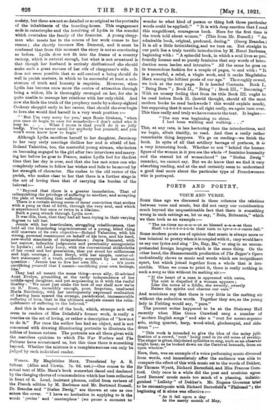Woman. By Magdeleine Marx. Translated by A. S. Seltzer. (Allen
and Unwin. 7s. 6d. net.)—One comes to the actual text of Mlle. Marx's book somewhat dazed and deafened by the clanging chorus of commendation which has been collected in front of it. Loud, insistent phrases, culled from reviews of the French edition by M. Barbusse and Mr. Bertrand Russell, Dr. Brandee and " Stefan Zweig," are thrown at one as one enters the cover. " I have no hesitation in applying to it the words ' genius' and ' masterpiece' (we pause a moment to wonder to what kind of person or thing both those particular words could be applied)." " It is with deep emotion that I read this magnificent, courageous book. Here for the first time is the truth told about women." (This from Mr. Russell.) " An admirable book, original, profound, daring." (Georg Brandes.) It is all a little intimidating, and we turn on. But straight in our path lies a truly terrific introduction by M. Henri Barbusse beginning with " A splendid book, in which a soul lives so pro: foundly human and so purely feminine that any words of intro- duction seem leaden and intrusive." All the same he goes on in tremendous fashion for a couple of pages, +o end with : " It is a powerful, a rebel, a virgin work, and it ranks Magdeleine Marx among the loftiest poets of our age." Thoroughly cowed, we look at the next page. It is headed Contents. Book I., " Being Born " ; Book II., " Being " ; Book III., " Becoming." With an uneasy feeling that from its title Book III. ought to be read before Book II. (horrid thought, should all the most modern books be read backwards ? this would explain much), but supposing that it must be all right really, we again turn over. This time really and truly we have come to the text. It begins:— " The sun was beginning to shine.
I had been walking and walking. . ."
This, at any rate, is less hectoring than the introductions, and we begin, albeit timidly, to read. And then a really rather remarkable thing happens. We go on reading—we finish the book. In spite of all that artillery barrage of prefaces, it is a very interesting book. Whether or not " behind the human figure of the woman in it you see the whole of feminine humanity and the eternal lot of womanhood " (as " Stefan Zweig " remarks), we cannot say. But we do know that we find it very absorbing reading, and at the end certainly seem to understand a good deal more about the particular type of Frenchwoman who is portrayed.


































 Previous page
Previous page